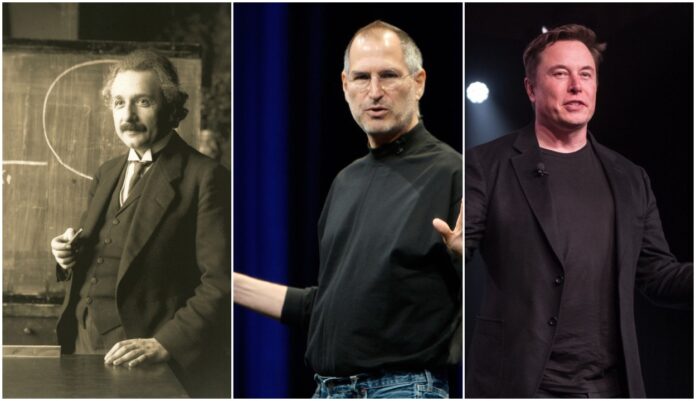There’s rarely a day when Tesla and SpaceX founder Elon Musk is not seen making the headlines, highlighting his business ventures. A sort of a Willy Wonka figure for technology, Musk seems to mystify people with every announcement he makes about space travel, artificial intelligence and electric cars. The analytical and idealistic engineer who is working to revolutionise transportation both on Earth and in space is clearly not just a businessman and not in it solely for money. And this is what makes him so interesting.
For the same reason Steve Jobs is venerated, Musk has a greater mission and a vast vision for the future and the human race as a whole.
So it’s absolutely not astounding that Musk gets compared to Albert Einstein. He was more than a scientist, he was a philosopher who ruminated on the future as well as the meaning of his work.
These people definitely have quite a lot in common, according to New York University Professor Melissa Schilling. In her business book ‘Quirky’, Schilling explores the lives of breakthrough innovators Einstein, Musk and Jobs, among others, examining their remarkable abilities, personalities and motives.
“These innovators worked in different fields and at different times, yet have some remarkable commonalities. Though they have some traits that we cannot imitate — like Musk’s photographic memory — there are other characteristics we can take advantage of, such as cultivating an ambitious goal, building our self-efficacy and spending time alone to exercise our independent thinking,” Schilling says. “Studying these profoundly important people shows us that there are ways we can nurture the breakthrough innovation potential in us all.”
These creative geniuses are not trapped by prior paradigms, and have three common traits.
- A Sense of Separateness
Musk, Einstein and Jobs all had a sense of separateness which created the space for original thinking. Having alone time allowed them to challenge assumptions and process the world around them on their own, thus reducing exposure to homogenising norms and enabling formation of original ideas and opinions.
If you are seeking out-of-the-box thinking, it is very important to work alone before engaging in collaboration. Do not fear being unorthodox. Jot down your ideas before sharing and comparing them with others. This is necessary to free yourself from the constraints of established solutions to problems. In short, spend time thinking and working alone before engaging in collaborative endeavours so as not to prevent yourself from fully developing your own ideas.
- Self-efficacy
Another common trait between Einstein, Jobs and Musk is their unwavering faith in their own ability to overcome obstacles and achieve their objectives. This trait of self-efficacy motivates innovators to take on tasks that others deem impossible.
These innovators aren’t necessarily risk-tolerant, but their confidence and even stubbornness in the face of criticism leads them to overcome any obstacle and stick to goals even when the going gets tough.
- An Idealistic Goal
A huge part of what motivates innovators like these is an ambitious and idealistic goal. None of these innovators stepped into the industry to incrementally extend existing products or to generate a high profit. Instead, they focused on revolutionising some aspect of human life. Einstein pursued his quest of the simple harmonious truth about universe whereas Musk is on the way to save the human species by weaning us off on fossil fuels and establishing a colony on Mars.
Indubitably, cultivating a grand and idealistic ambition that fuels your motivation and encourages you to exert tremendous effort is essential not only to defend your ego but also to help win others to your cause.
Learn how you can take your leadership teams through a growth model which will help them mature on a personal and professional level by following me on LinkedIn and subscribing to the Keijzer Community.
Paul Keijzer is the CEO and Founder of Engage Consulting and the co-Founder of The Talent Games, which aims to transform HR by digitising talent processes and creating more engaging and productive workplaces through gamification and mobile technology. As a global HR and Leadership Management expert, Paul knows how to combine business insights with people insights to transform organisations and put them on the path to growth.



